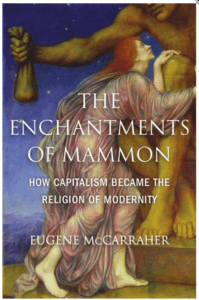The American historian Eugene McCarraher has been chewing around the intersection of Marxism and Christianity for some time. In several of his published pieces he has drawn attention to the surprising degree of ideological convergence that has been going on as a number of Marxists have found God – Terry Eagleton, Slavoj Zizek etc.
 But with his new book, McCarraher has brought together two decades of reflection into a sustained thesis on the spiritual crisis that has been brought about by capitalism. And it has been hailed by James Chappel in the Boston Review as “a landmark in American cultural and intellectual history”. That is quite some claim.
But with his new book, McCarraher has brought together two decades of reflection into a sustained thesis on the spiritual crisis that has been brought about by capitalism. And it has been hailed by James Chappel in the Boston Review as “a landmark in American cultural and intellectual history”. That is quite some claim.
As Chappel recounts, the thesis is as simple as it is sustained. Those like Max Weber who claimed capitalism brought about a mass disenchantment with the world have got it importantly wrong. Yes, capitalism involves a wholesale system of rational administration, but it has not so much destroyed the spiritual world view of Christianity as replaced it with an alternative system, equally spiritual and equally pervasive, but spiritually pernicious.
“Modernity is a deal” writes Yuval Noah Hurari: “The entire contract can be summed up in a single phrase: humans agree to give up meaning in exchange for power”.
McCarraher strongly disagrees. Modernity is the replacement of one meaning system with another. And one that is destroying us.
“McCarraher contends that this whole story [of disenchantment] is disastrously misguided,” writes Chappel: “it keeps us from seeing how capitalism functions, and why it continues to exert so much appeal. Disenchantment, he argues, never happened.”
Our world is still soaked with meaning, just as it was in the Middle Ages. We are not abandoned to a universe of moral relativism and nihilism, because capitalism and its prophets have offered an astonishingly stable set of alternatives. “Capitalism,” McCarraher insists, “is a love story.” What he means is that the market translates the poetry of our desire into the prose of institutions and exchange.”
This reminds me a little of that astonishing address given by David Foster Wallace in 2005 called “This is Water” in which he claims: “… in the day-to-day trenches of adult life, there is actually no such thing as atheism. There is no such thing as not worshipping. Everybody worships. The only choice we get is what to worship. And the compelling reason for maybe choosing some sort of god or spiritual-type thing to worship–be it JC or Allah, be it YHWH or the Wiccan Mother Goddess, or the Four Noble Truths, or some inviolable set of ethical principles–is that pretty much anything else you worship will eat you alive.”
Capitalism doesn’t rid the world of magic. Instead it replaces good magic with bad magic.
The Enchantments of Mammon: How Capitalism Became the Religion of Modernity is published in a few weeks time. Sounds like a must-read to me.








Join the discussion
Join like minded readers that support our journalism by becoming a paid subscriber
To join the discussion in the comments, become a paid subscriber.
Join like minded readers that support our journalism, read unlimited articles and enjoy other subscriber-only benefits.
SubscribeThanks for the recommendation. I’ve known this sine reading RH Tawney’s Religion and The Rise of Capitalism but would like to learn more.